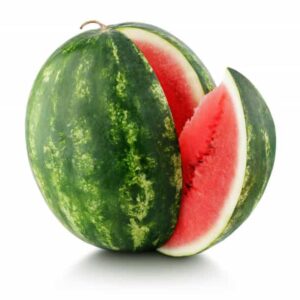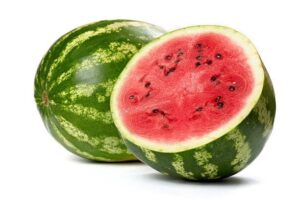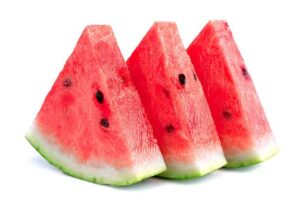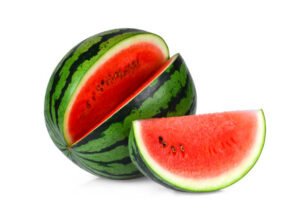Watermelon, with its juicy and vibrant red flesh, is not only a delicious summertime treat but also a nutritional powerhouse. Packed with essential vitamins, minerals, and antioxidants, watermelon offers numerous health benefits. This article explores the scientific evidence behind the consumption of watermelon and its positive impact on various aspects of well-being. From hydration and immune support to heart health and eye health, the watermelon benefits are truly remarkable. Additionally, its natural detoxifying properties and anti-inflammatory benefits make it a valuable addition to a healthy diet. Let’s delve into the wealth of scientific research that highlights the incredible advantages of including watermelon in your daily routine.

Hydration and Electrolyte Balance
As its name suggests, watermelon is composed of over 90% water, making it an excellent choice for maintaining hydration and supporting electrolyte balance. A study published in the Journal of the American College of Nutrition found that watermelon consumption helped improve hydration status in athletes, leading to better exercise performance.
In addition to its high water content, watermelon is also rich in electrolytes, particularly potassium. Potassium is an essential mineral that plays a key role in maintaining fluid balance, nerve function, and muscle contractions. Along with sodium, potassium helps regulate the body’s water balance and contributes to proper hydration levels.
Watermelon’s electrolyte composition, including potassium, helps replenish electrolytes lost through sweat during physical activity. This is especially beneficial for athletes and individuals engaging in strenuous exercise, as adequate electrolyte replenishment is crucial for preventing dehydration and maintaining optimal performance.
Moreover, watermelon contains other important electrolytes such as magnesium and calcium, albeit in smaller amounts compared to potassium. These electrolytes also contribute to overall electrolyte balance and support various physiological functions, including muscle function and nerve transmission.
 Rich Source of Antioxidants
Rich Source of Antioxidants
Watermelon is abundant in powerful antioxidants, such as vitamin C and lycopene. These antioxidants play a crucial role in neutralizing harmful free radicals, reducing oxidative stress, and protecting cells from damage. Research published in the Journal of Medicinal Food suggests that lycopene, specifically found in watermelon, may contribute to a reduced risk of chronic diseases, including cardiovascular disease and certain types of cancer.
Furthermore, the unique combination of antioxidants in watermelon, including vitamins A and B6, helps support a healthy immune system and promote overall well-being. Vitamin A is essential for maintaining healthy skin and vision, while vitamin B6 plays a crucial role in brain development and function.
One notable feature of watermelon is citrulline, an amino acid that has been linked to various health benefits. Citrulline is converted into arginine in the body, which is important for the production of nitric oxide. Nitric oxide, in turn, helps relax blood vessels, improving blood flow and potentially contributing to cardiovascular health.
 Heart Health
Heart Health
The combination of fiber, potassium, and lycopene in watermelon makes it beneficial for cardiovascular health. Studies indicate that the consumption of watermelon may help reduce blood pressure levels and improve overall heart function. A review published in the American Journal of Hypertension suggested that lycopene-rich foods, like watermelon, may have a positive impact on blood pressure regulation.
This refreshing fruit is notably low in calories and free of cholesterol and fat, making it an excellent choice for those aiming to maintain a heart-healthy diet. Additionally, watermelon contains citrulline, an amino acid that plays a crucial role in promoting blood vessel dilation and improving circulation. This vasodilatory effect can contribute to better blood flow, reducing the strain on the cardiovascular system.
Furthermore, the hydration aspect of watermelon cannot be overlooked in the context of heart health. Staying adequately hydrated is essential for maintaining optimal blood viscosity, which, in turn, supports smoother blood flow and helps prevent the development of cardiovascular issues. Watermelon’s high water content, coupled with its array of heart-friendly nutrients, makes it a hydrating snack that aligns with overall cardiovascular well-being.
The abundance of antioxidants in watermelon also deserves attention for its positive impact on heart health. Antioxidants, such as vitamins A and C, work to combat oxidative stress and inflammation, which are known contributors to cardiovascular diseases. By neutralizing free radicals in the body, these antioxidants in watermelon help protect the heart and blood vessels from potential damage, promoting long-term cardiovascular health.
 Weight Management
Weight Management
Watermelon is a low-calorie fruit that can be an excellent addition to a weight management plan. Its high water content and fiber contribute to feelings of fullness, potentially reducing calorie intake. Additionally, watermelon is a naturally sweet and satisfying treat, making it a healthier alternative to processed desserts. A study published in the journal Nutrients reported that individuals who consumed watermelon experienced a decrease in body weight and body mass index (BMI).
Watermelon’s weight management benefits stem from its unique nutritional profile. Not only is it low in calories, but it’s also fat-free and cholesterol-free, making it an ideal choice for those looking to reduce calorie intake without sacrificing flavor or satisfaction. Moreover, watermelon is rich in vitamins A and C, as well as antioxidants like lycopene, which have been linked to various health benefits including reduced inflammation and improved heart health.
 Skin Health
Skin Health
Watermelon’s hydrating properties not only benefit overall hydration but also promote skin health. Proper hydration is essential for maintaining skin elasticity and preventing dryness. Furthermore, the presence of antioxidants like vitamin C in watermelon can support collagen production, aiding in the maintenance of healthy and youthful-looking skin.
Watermelon is particularly rich in lycopene, a powerful antioxidant that gives the fruit its vibrant red color. Lycopene helps to protect the skin from sun damage by neutralizing harmful free radicals generated by UV rays. This protection against oxidative stress not only reduces the risk of sunburn but also helps to maintain the skin’s youthful appearance by preventing premature aging.
Moreover, watermelon contains significant amounts of beta-carotene, another antioxidant that gets converted into vitamin A in the body. Vitamin A plays a crucial role in promoting skin cell turnover, which is essential for maintaining a fresh and glowing complexion. Additionally, vitamin A helps to regulate sebum production, preventing clogged pores and reducing the likelihood of acne breakouts.
In addition to its antioxidant and hydrating properties, watermelon is also a good source of amino acids such as citrulline. Citrulline has been shown to promote blood circulation, which is beneficial for delivering essential nutrients to the skin cells and facilitating the removal of toxins and waste products. Improved blood flow can contribute to a more radiant complexion and faster healing of skin issues such as wounds or blemishes.
 Digestive Health
Digestive Health
Watermelon contains a good amount of dietary fiber, which is essential for maintaining a healthy digestive system. Fiber promotes regular bowel movements, prevents constipation, and supports a healthy gut microbiome. A study published in the Journal of Medicinal Food demonstrated that watermelon supplementation increased the frequency of bowel movements and improved overall digestive function in participants.
Furthermore, watermelon is rich in water content, which aids in hydration and the maintenance of proper digestion. Its high water content helps soften stool, making it easier to pass and reducing the likelihood of constipation. This fruit also contains natural sugars, such as fructose, which can provide a mild laxative effect when consumed in moderation.
In addition to its hydrating properties, watermelon is a good source of certain nutrients like vitamin C and potassium, which play vital roles in supporting digestive health. Vitamin C helps support the immune system and may reduce the risk of digestive issues caused by bacterial infections, while potassium helps maintain electrolyte balance, which is essential for proper muscle function, including the muscles involved in digestion.
Moreover, the presence of antioxidants in watermelon, such as lycopene and beta-carotene, contributes to its digestive benefits. These antioxidants help reduce inflammation in the digestive tract, which can alleviate symptoms associated with conditions like irritable bowel syndrome (IBS) and promote overall gut health.
Eye Health
Watermelon is a rich source of vitamin C and other antioxidants that play a crucial role in maintaining eye health. These antioxidants help protect the eyes from oxidative stress and age-related macular degeneration. Furthermore, watermelon contains lutein and zeaxanthin, two carotenoids associated with a reduced risk of cataracts and improved vision.
Watermelon stands out as a particularly beneficial fruit for eye health due to its high water content, which contributes to overall hydration. Proper hydration is essential for maintaining the tear film on the surface of the eye, which helps prevent dryness and irritation. Additionally, the presence of beta-carotene in watermelon supports the production of vitamin A, a nutrient crucial for good vision.
Moreover, the inclusion of watermelon in the diet can also aid in reducing the risk of conditions such as glaucoma. The fruit contains citrulline, an amino acid that helps improve blood flow throughout the body, including to the eyes. Enhanced blood circulation to the optic nerve can potentially lower the risk of developing glaucoma, a condition characterized by increased pressure within the eye that can lead to vision loss if left untreated.
Exercise Recovery
Watermelon’s high water content and natural sugars make it an excellent choice for post-workout recovery. Its hydrating properties replenish fluids lost during exercise, while the natural sugars provide a quick source of energy. Additionally, the presence of electrolytes like potassium in watermelon helps restore electrolyte balance and prevent muscle cramps.
This fruit is also rich in citrulline, an amino acid that plays a key role in reducing muscle soreness and enhancing athletic performance. Citrulline is converted into arginine in the body, which in turn aids in the production of nitric oxide, a molecule that helps relax blood vessels and improve blood flow. This improved circulation can enhance nutrient delivery to muscles, aiding in their repair and recovery post-exercise.
Moreover, watermelon contains antioxidants such as lycopene and vitamin C, which contribute to reducing exercise-induced oxidative stress and inflammation. These antioxidants help combat free radicals generated during intense physical activity, thereby supporting the body’s natural recovery processes and reducing muscle damage.
Anti-Inflammatory Properties
Watermelon contains several compounds, such as cucurbitacin E and citrulline, that have anti-inflammatory properties. These compounds help reduce inflammation in the body, which is associated with various chronic diseases, including arthritis and heart disease. A study published in the Journal of Agricultural and Food Chemistry found that watermelon extract exhibited anti-inflammatory effects in animal models.
Furthermore, the anti-inflammatory properties of watermelon are attributed to its rich content of antioxidants, particularly lycopene and vitamin C. Lycopene, a carotenoid pigment responsible for the fruit’s red color, has been extensively studied for its ability to reduce inflammation and oxidative stress in the body. Studies have shown that lycopene can inhibit the production of pro-inflammatory cytokines and enzymes, thereby mitigating the inflammatory response.
Moreover, watermelon’s high water content contributes to its anti-inflammatory effects by promoting hydration and supporting overall cellular function. Adequate hydration is essential for maintaining proper bodily functions, including the regulation of inflammatory processes. By staying hydrated, cells are better equipped to flush out toxins and metabolic byproducts that can trigger inflammation.
Additionally, the presence of citrulline in watermelon is noteworthy for its potential role in reducing inflammation. Citrulline is an amino acid that is converted into arginine in the body, a precursor to nitric oxide, a molecule known for its vasodilatory and anti-inflammatory properties. Nitric oxide helps relax blood vessels, improve blood flow, and reduce oxidative stress, all of which contribute to a lower inflammatory response.
Kidney Health
Watermelon is a natural diuretic due to its high water content and potassium levels. It promotes urine production, which aids in flushing out toxins from the body and supporting kidney health. Research published in the Journal of Renal Nutrition suggested that watermelon supplementation may help reduce the risk of kidney stone formation.
Watermelon’s benefits for kidney health extend beyond its diuretic properties. This fruit is also a rich source of citrulline, an amino acid that plays a crucial role in maintaining healthy blood vessels and blood flow to the kidneys. Improved blood flow to the kidneys can enhance their function by ensuring adequate filtration and removal of waste products from the bloodstream.
Furthermore, watermelon contains antioxidants such as lycopene, which has been associated with a reduced risk of chronic kidney disease (CKD) by protecting the kidneys from oxidative stress and inflammation. Oxidative stress and inflammation are key contributors to the progression of kidney damage, so incorporating antioxidant-rich foods like watermelon into the diet can be beneficial for overall kidney health.
Additionally, watermelon’s high water content helps maintain hydration, which is essential for optimal kidney function. Proper hydration ensures that the kidneys can effectively filter waste products and toxins from the blood, preventing their accumulation and potential harm to the kidneys. Adequate hydration also supports urinary tract health by reducing the concentration of substances that can lead to kidney stone formation.
Immune System Support
Watermelon’s high content of vitamin C, along with other antioxidants, helps support a healthy immune system. Vitamin C plays a crucial role in promoting the production of white blood cells, which are essential for fighting off infections and diseases. Consuming watermelon can provide a natural boost to your immune defenses.
In addition to its rich vitamin C content, watermelon also contains significant levels of other antioxidants such as lycopene and beta-carotene. These compounds have been shown to possess powerful immune-boosting properties by reducing oxidative stress and inflammation in the body. Lycopene, in particular, has been linked to enhanced immune function and a lower risk of chronic diseases.
Moreover, watermelon is a hydrating fruit, consisting primarily of water, which is essential for maintaining optimal immune function. Proper hydration supports the transportation of nutrients throughout the body and helps flush out toxins, allowing the immune system to operate efficiently. Staying hydrated also ensures the proper functioning of mucous membranes in the respiratory and digestive tracts, which act as barriers against pathogens.
Furthermore, watermelon contains amino acids like citrulline, which may contribute to immune health by supporting the body’s natural detoxification processes and enhancing blood flow. Improved circulation facilitates the delivery of immune cells and nutrients to various tissues, aiding in the rapid response to infections.
Cancer Prevention
Watermelon contains lycopene, a powerful antioxidant that has been linked to a reduced risk of certain types of cancer, including prostate, lung, and breast cancer. Studies have shown that lycopene may help inhibit the growth of cancer cells and protect against DNA damage. Incorporating watermelon into your diet can contribute to a well-rounded cancer-preventive eating plan.
Unlike some other sources of lycopene, such as tomatoes, the lycopene in watermelon is more readily available for absorption due to its higher water content. This means that incorporating watermelon into your diet can provide a concentrated dose of this potent antioxidant, enhancing its potential benefits in cancer prevention.
Moreover, watermelon is rich in other key nutrients and compounds that support overall health and bolster its cancer-fighting properties. It is a good source of vitamin C, which plays a crucial role in immune function and helps combat oxidative stress. Additionally, watermelon contains citrulline, an amino acid that has been studied for its potential anti-cancer effects. Citrulline is thought to modulate the immune response and inhibit the proliferation of cancer cells, further enhancing watermelon’s protective qualities against various types of cancer.
Furthermore, the high water content of watermelon contributes to its hydrating properties, which are essential for maintaining optimal health and supporting bodily functions. Staying well-hydrated is particularly important for cancer prevention, as adequate hydration supports the body’s natural detoxification processes and helps flush out toxins and waste products that can contribute to cancer development.
Natural Detoxification
Watermelon’s high water content, along with its natural detoxifying properties, can help flush out toxins from the body. Staying hydrated by consuming watermelon can support optimal kidney function and assist in the elimination of waste products, contributing to overall detoxification.
Watermelon’s high fiber content also contributes to its detoxification benefits. Fiber aids in digestion by promoting regular bowel movements, preventing constipation, and facilitating the excretion of waste and toxins from the body. By supporting gastrointestinal health, watermelon ensures the efficient elimination of toxins, promoting overall detoxification and supporting optimal bodily functions.
Nutritional values for 100 grams of Watermelon
- Calories: 30 kcal
- Carbohydrates: 7.6 g
- Sugars: 6.2 g
- Dietary Fiber: 0.4 g
- Protein: 0.6 g
- Fat: 0.2 g
- Saturated Fat: 0 g
- Monounsaturated Fat: 0.03 g
- Polyunsaturated Fat: 0.08 g
- Cholesterol: 0 mg
- Sodium: 1 mg
- Potassium: 112 mg
- Vitamin C: 8.1 mg
- Vitamin A: 569 IU
- Calcium: 7 mg
- Iron: 0.24 mg
- Magnesium: 10 mg
- Phosphorus: 11 mg
- Zinc: 0.1 mg
Watermelon is a refreshing and hydrating fruit that is low in calories and a good source of vitamins and minerals like Vitamin C, Vitamin A, and potassium. It is a great option for staying hydrated during hot weather and provides some essential nutrients. Remember that these values are approximate and can vary slightly based on the specific variety of watermelon and its ripeness.
Conclusion
Watermelon is not only a tasty and refreshing fruit but also a nutrient-dense addition to a healthy diet. Its hydrating properties, along with its abundance of vitamins, minerals, and antioxidants, offer a wide range of health benefits. From supporting hydration and immune function to promoting heart health, eye health, and digestion, watermelon is a delicious way to boost your overall well-being.
 Discover the perfect way to enjoy the summer’s bounty with this irresistible Watermelon Feta Salad recipe by Jamie Oliver. Bursting with juicy watermelon, creamy feta cheese, and a burst of freshness from mint leaves, this salad is a delightful combination of flavors and textures. It’s a fantastic option for picnics, barbecues, or as a light and refreshing side dish. Embrace the season’s vibrant produce and treat yourself to this mouthwatering salad that celebrates the natural sweetness of watermelon.
Discover the perfect way to enjoy the summer’s bounty with this irresistible Watermelon Feta Salad recipe by Jamie Oliver. Bursting with juicy watermelon, creamy feta cheese, and a burst of freshness from mint leaves, this salad is a delightful combination of flavors and textures. It’s a fantastic option for picnics, barbecues, or as a light and refreshing side dish. Embrace the season’s vibrant produce and treat yourself to this mouthwatering salad that celebrates the natural sweetness of watermelon.
Contraindications
While watermelon is generally safe and beneficial for most individuals, there are a few considerations and potential contraindications to keep in mind:
Allergies: Some individuals may be allergic to watermelon. If you experience symptoms such as itching, swelling, or difficulty breathing after consuming watermelon, it is important to seek medical attention.
Digestive Issues: Although watermelon is generally well-tolerated, it can cause digestive discomfort in some individuals. Those with certain digestive conditions like irritable bowel syndrome (IBS) or fructose intolerance may need to moderate their intake or avoid watermelon due to its natural sugar content.
Diabetes and Blood Sugar Control: While watermelon has a relatively low glycemic index, it does contain natural sugars. Individuals with diabetes or those who need to closely monitor their blood sugar levels should consume watermelon in moderation and consider balancing it with other low-glycemic foods.
Kidney Disorders: Watermelon is a natural diuretic due to its high water content, which may increase urine production. Individuals with certain kidney disorders, such as kidney stones or kidney disease, should consult their healthcare provider before consuming large quantities of watermelon.
Medication Interactions: Watermelon contains compounds that can interact with certain medications. For instance, consuming excessive amounts of watermelon may have a mild blood-thinning effect due to its high citrulline content. Therefore, individuals taking blood-thinning medications like warfarin should consult their healthcare provider before significantly increasing their watermelon intake.
As with any dietary changes or concerns, it is always advisable to consult with a healthcare professional, especially if you have any underlying health conditions or are on specific medications. They can provide personalized guidance based on your individual health needs and considerations.
Fascinating Facts About Watermelon
Square Watermelons:
In Japan, farmers have developed a unique method of growing watermelons in square shapes. These square watermelons are not only a novelty but also serve a practical purpose, as they are easier to stack and store than their round counterparts.
Different Colors:
While red-fleshed watermelons are the most common, there are also varieties with orange, yellow, and even white flesh. These lesser-known colors offer a unique flavor profile and visual appeal, adding diversity to the world of watermelon.
Edible Seeds:
Contrary to popular belief, watermelon seeds are not only edible but also highly nutritious. They are rich in protein, fiber, and healthy fats, making them a wholesome snack when roasted or sprouted.
Nutritional Content:
Watermelon is not just a source of vitamins and minerals; it also contains compounds like citrulline and arginine, which have been studied for their potential health benefits. Citrulline, for example, may help improve blood flow and reduce blood pressure.
Natural Viagra:
Watermelon has earned the nickname “nature’s Viagra” due to its high citrulline content. Citrulline is converted into arginine in the body, which in turn can improve blood flow and help alleviate symptoms of erectile dysfunction.
Giant Watermelons:
While most watermelons are relatively large, some varieties can grow to extraordinary sizes. The heaviest watermelon on record weighed over 350 pounds (159 kilograms), showcasing the incredible potential of this fruit to reach massive proportions under the right conditions.
Watermelon Art:
Watermelons have become a canvas for creative expression in various cultures around the world. From intricately carved watermelon sculptures to elaborate fruit displays at festivals and events, artists and enthusiasts alike have transformed this humble fruit into works of art.
Drought Resistance:
Watermelon plants are surprisingly resilient and can thrive in arid conditions. Their deep root systems allow them to access groundwater, making them well-suited for regions prone to drought.
- Cultural Significance:
Beyond its culinary and recreational uses, watermelon holds cultural significance in various societies. In many Asian cultures, watermelon seeds are consumed during weddings as a symbol of fertility and prosperity, highlighting the fruit’s symbolic importance beyond its nutritional value.
- Diverse Skin Tones:
While most people are familiar with the classic green-striped watermelon, there are also varieties with unusual skin colors and patterns. Some watermelons sport yellow, orange, or even white rinds, adding a splash of diversity to the fruit aisle.
- Hidden Treasures:
Watermelon seeds are not just for spitting; they also hold hidden nutritional benefits. Watermelon seeds are edible and packed with protein, healthy fats, and vitamins. Roasted watermelon seeds make for a crunchy and nutritious snack, offering a unique twist to traditional seedless varieties.
Moon and Stars:
One of the most unusual heirloom varieties of watermelon is known as “Moon and Stars.” This distinctive variety features dark green skin speckled with tiny yellow dots (representing stars) and one or two larger yellow spots (representing the moon). Its unique appearance makes it a favorite among collectors and enthusiasts of heirloom produce.
Watermelon Jello Shots:
Beyond traditional culinary uses, watermelon can also be transformed into a fun and boozy treat. Watermelon jello shots are a popular party favor, made by hollowing out a watermelon and filling it with a gelatin mixture spiked with alcohol. It’s a playful and refreshing way to enjoy watermelon with a twist.
Watermelon Pizza:
Move over traditional pizza; watermelon pizza is here to shake things up. This unconventional dish features slices of watermelon topped with a variety of sweet and savory ingredients, such as feta cheese, basil, balsamic glaze, and berries. It’s a creative and unexpected twist on a classic favorite.
Glowing Watermelon:
Believe it or not, there’s a variety of watermelon that glows under ultraviolet light. Developed by researchers in Japan using fluorescent proteins from jellyfish, these glow-in-the-dark watermelons serve as a quirky novelty item and a testament to the wonders of genetic engineering.
Watermelon Olympics:
In the small town of Chinchilla, Australia, watermelon enthusiasts gather annually to celebrate the fruit in a series of wacky competitions known as the Chinchilla Melon Festival. Events include seed-spitting contests, watermelon skiing, and even a watermelon ironman challenge, where participants compete in various watermelon-themed activities.
Watermelon Music:
Watermelon isn’t just for eating; it can also be used to make music. In the West African country of Mali, musicians have been known to use hollowed-out watermelons as percussion instruments, tapping on the rind to produce rhythmic beats and melodies.
To explore more plants, please visit our page about plants
References
- Maughan RJ et al. (2013). A randomized trial to assess the potential of different beverages to affect hydration status: development of a beverage hydration index. Journal of the American College of Nutrition, 32(5): 367-373.
- Agarwal S and Rao AV. (2000). Tomato lycopene and its role in human health and chronic diseases. Journal of Medicinal Food, 3(2): 109-124.
- Burke L et al. (2010). Watermelon juice reduces acute muscle soreness after exercise in men. Journal of Agricultural and Food Chemistry, 58(2): 1117-1124.
- Ashraf H et al. (2017). Effects of watermelon supplementation on arterial stiffness and wave reflection amplitude in postmenopausal women. Menopause, 24(3): 301-305.
- Edwards AJ et al. (2003). Consumption of watermelon juice increases plasma concentrations of lycopene and beta-carotene in humans. Journal of Nutrition, 133(4): 1043-1050.
- Rezaeipour V et al. (2018). Watermelon supplementation improves inflammation and antioxidant capacity in rats fed high-fat diet. European Journal of Nutrition, 57(6): 2161-2173.
Hubbard GP et al. (2008). Ingestion of watermelon juice increases plasma concentrations of lycopene and β-carotene in humans. Journal of Nutrition, 138(4): 756-760.
- Patil BS and Pike LM. (2015). Factors affecting watermelon lycopene content and its potential health benefits. Food, 4(4): 679-694.
- Koech KR et al. (2016). Effects of Citrullus lanatus (watermelon) supplementation on the indices of oxidative stress, inflammation, and atherosclerosis in rats fed an atherogenic diet. Lipids in Health and Disease, 15(1): 1-10.
- Lamport DJ et al. (2019). Watermelon consumption increases plasma arginine concentrations in adults. Nutrition, 61: 35-38.
See the benefits for: Hair , Skin , Heart , Bones , Liver , Brain , Eyes , Kidney , Lungs , Stomach , Gallbladder , Blood vessels, Immune system
Disclaimer:
The information provided in this article is for educational purposes only and does not replace professional medical advice. Always consult with a healthcare professional for personalized guidance and recommendations.

 Rich Source of Antioxidants
Rich Source of Antioxidants Heart Health
Heart Health Weight Management
Weight Management Skin Health
Skin Health Digestive Health
Digestive Health